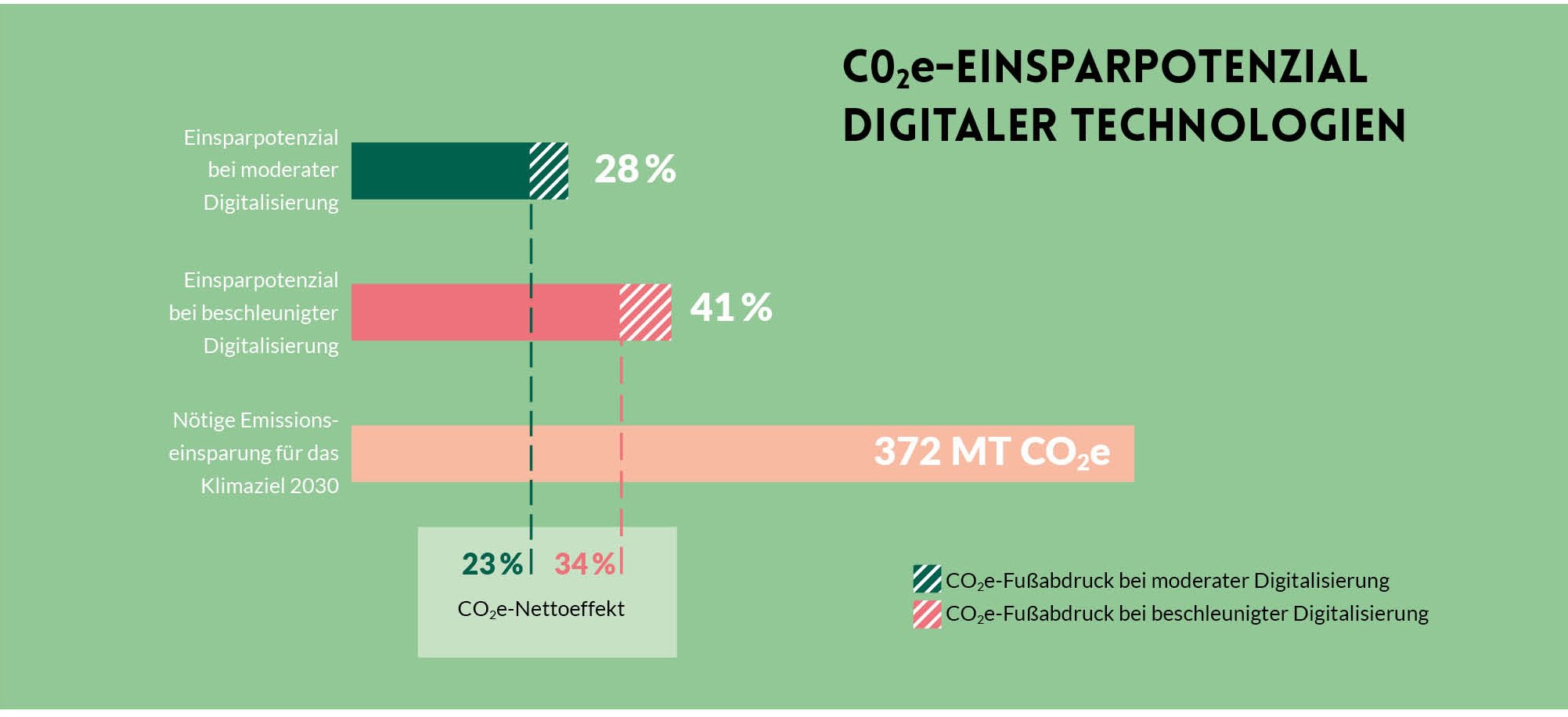Green Digitalisation
Can digitalisation save us from the climate crisis? Or will it only make things much worse? The fact is: the increased use of digital technologies leads to rising energy and resource consumption, but at the same time offers opportunities for climate protection.
Digitalisation is both an opportunity and a risk for the climate: on the one hand, digital technologies play a central role in the implementation of the energy, transport and heat transition. On the other hand, information and communication technology itself is increasingly responsible for the rise in global energy consumption and the emission of climate-damaging greenhouse gases. Complex data centres and continuous streaming, artificial intelligence, cryptocurrency and NFTs - digitalisation requires a lot of energy. For example, the Cambridge Bitcoin Electricity Consumption Index has analysed the energy consumption of bitcoin mining. According to the index, it currently consumes around 125 terawatt hours of electricity per year. By comparison, the whole of Sweden consumed around 130 terawatt hours last year. Existing studies show that the greenhouse gas emissions caused by the production, operation and disposal of digital end devices and infrastructures today account for between 1.8 and 3.2 per cent of global GHG emissions. According to estimates, the global emission volume of digitalisation in 2020 was around 200 to 250 megatonnes of CO₂ (one megaton is equivalent to 1,000 tonnes).
„The fact is: Germany‘s climate goals cannot be achieved without the digital transformation.“
At the same time, smart technologies can help us fight the climate crisis. This is the central finding of a study commissioned by KfW Research and conducted by the Öko-Institut and the Institute for Futures Studies and Technology Assessment (IZT) on the interactions between the two megatrends of digitalisation and climate neutrality. The fact is: Germany‘s climate goals cannot be achieved without the digital transformation. This assessment can also be seen in this year‘s study by the consulting firm Accenture. In order to achieve the climate targets of German industry by 2030, Industry 4.0, i.e. digitalisation in German companies as quickly as possible, seems to be the most sensible way. According to the digital association Bitkom, if Germany were to follow the example of comparable leading countries like the USA in terms of digitalisation, up to 64 million tonnes of CO₂ could be saved in 2030 - which is roughly equivalent to the average annual CO₂ emissions of Austria.
For example, companies can use digitalisation measures to reduce their energy, water and material consumption as well as emissions and better ensure compliance with environmental legislation. At the same time, processes can be optimised, transparency promoted and costs reduced. If digitalisation in Germany develops as moderately as it has looked in recent years, the potential for carbon dioxide savings would only be 37 million tonnes in 2030, according to the study.
The most important measures against the climate crisis include the reduction of climate-damaging greenhouse gas emissions, the protection of ecosystems and their adaptation to climate change. Artificial intelligence is increasingly being used in this context. Scientists show scenarios in which AI could support strategies for climate protection and adaptation to climate change - for example in the energy sector, in goods production, in agriculture and forestry or in disaster management. Artificial intelligence can thus help to accelerate scientific experiments and thus the development of clean technologies. According to a study by the Heinrich Böll Foundation, whether the use of artificial intelligence is able to reduce resource consumption and emissions instead of driving them even higher will depend on political strategies and legal framework conditions.
Currently, information and communication technologies are estimated to require a total of about 2 per cent of the world‘s electricity. According to estimates, consumption may increase to 20 percent by 2030. The science magazine Nature published a study in January 2020 that looked at the connection between AI and climate protection. Their conclusion: AI can help achieve the defined goals, especially in terms of environmental protection: for example, detecting oil spills in the oceans. AI can help reshape the energy market and use energy sustainably. AI can also help save resources and improve recycling. AI technologies can also enrich climate protection, provided that the digital economy also takes greater account of ecological aspects.
In the future, the movement towards “green digitalisation” will increase dramatically and may be one of the most decisive factors in solving the climate problem. Start-ups that develop solutions for the environment, ecology and sustainability in an innovative and economically viable way are on the rise. Many innovative ideas are being generated, especially in the areas of energy, mobility and construction: for example, digital energy infrastructures for solar systems in the neighbourhood, circular business models that recycle e-waste in a sensible way or complex systems that filter CO₂ directly from the atmosphere. There are now dozens of incubators for the green start-up scene across Germany, such as the accelerators and platforms Smart Green, Start Green or Grüne Start Ups.
„Düsseldorf can provide important impulses for reducing CO2 emissions in the economy”
Dr. Stephan Keller, Lord Mayor, Düsseldorf
Innovations for a climate-friendly industry are also the focus of the decarbXpo trade show for industrial decarbonisation and energy storage, which took place at the Düsseldorf exhibition centre at the end of September. Plug and Play Sustainability NRW is the 5th German location of the global innovation platform Plug and Play and, in cooperation with the Economic Development Agency Düsseldorf, presented ten top global and regional start-ups from the fields of decarbonisation, energy storage and hydrogen at the trade show. Products and services that help industrial companies find the best path to climate neutrality for them. This is also on the agenda of the City of Düsseldorf, which wants to be climate-neutral by 2035 and has concluded a climate pact with the local business community to this end. “As an international and innovative business location with a network of industrial companies, scientific institutions and the excellent infrastructure to attract start-ups, Düsseldorf can provide important impulses for reducing CO2 emissions in the economy,” says Lord Mayor Dr Stephan Keller. If industrialisation has plunged us into the climate crisis, perhaps green digitalisation can actually save us at the last moment. Provided it improves its energy efficiency. •
Words Karolina Landowski
Pictures iStock, Dr. Stephan Keller



